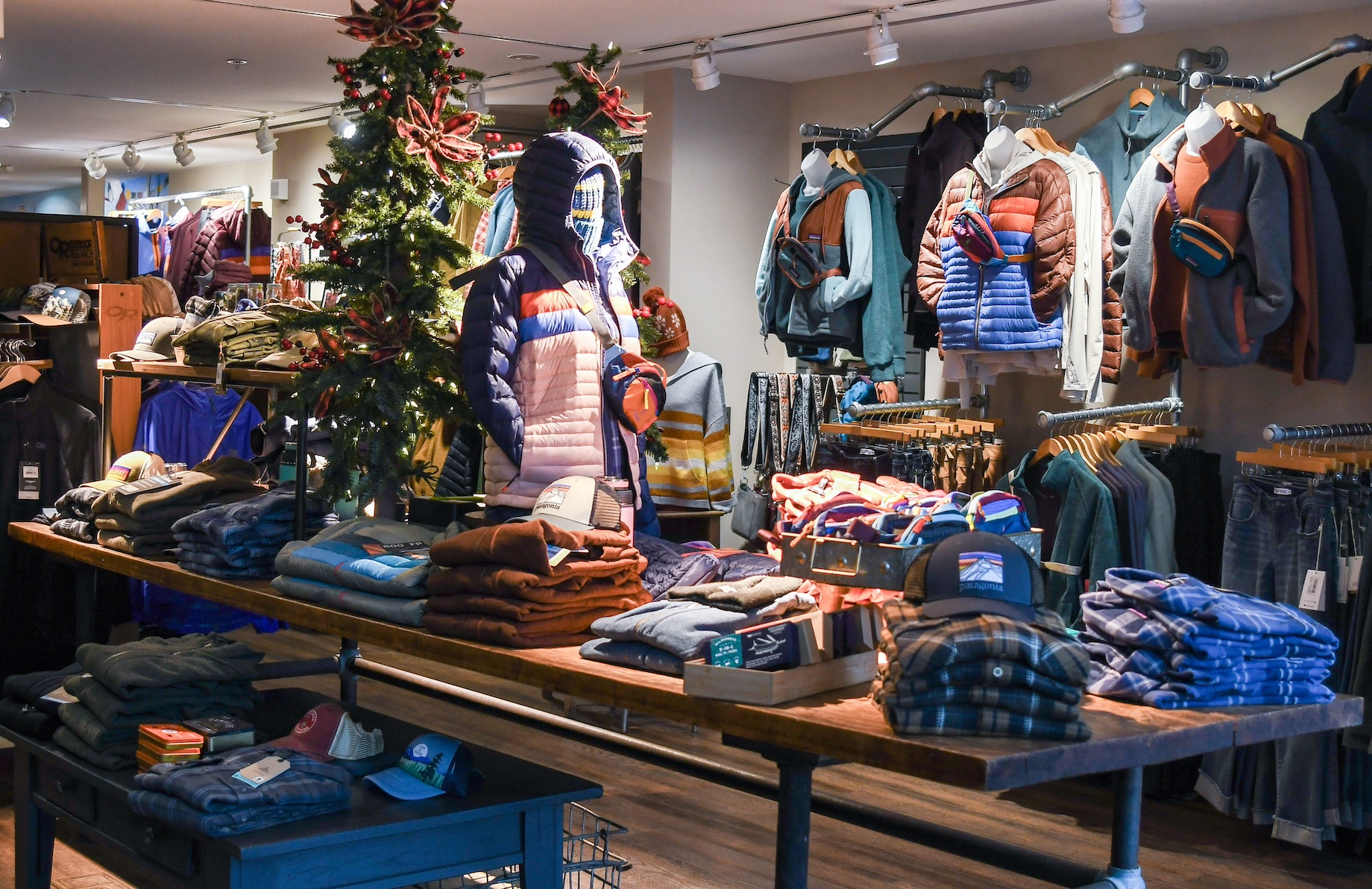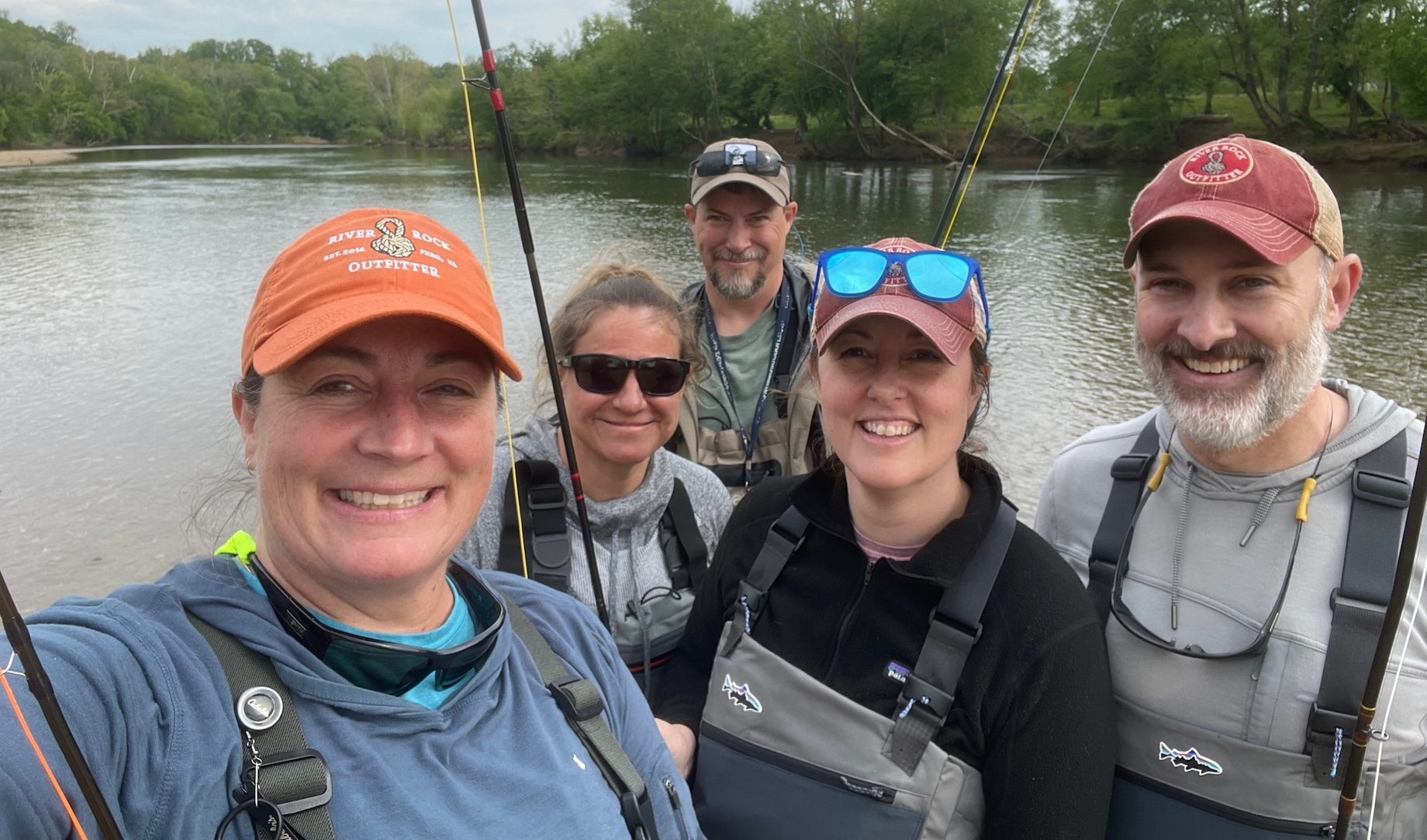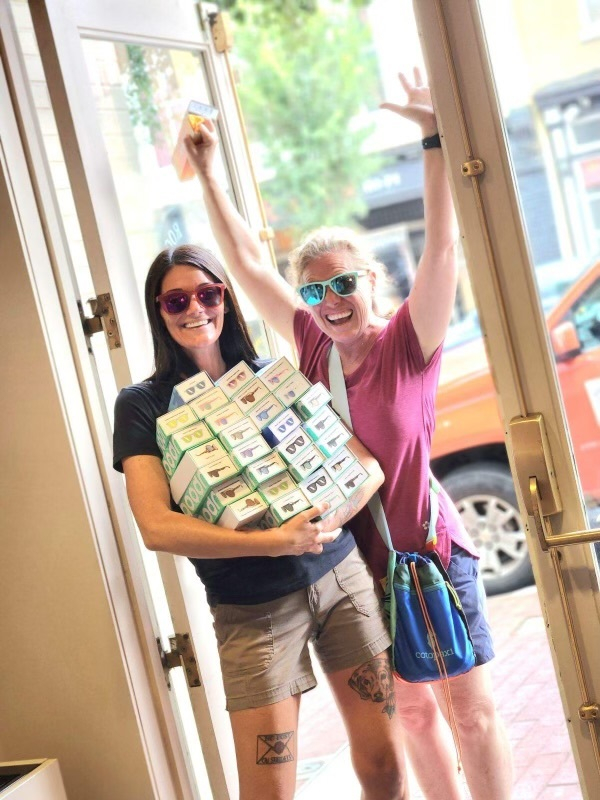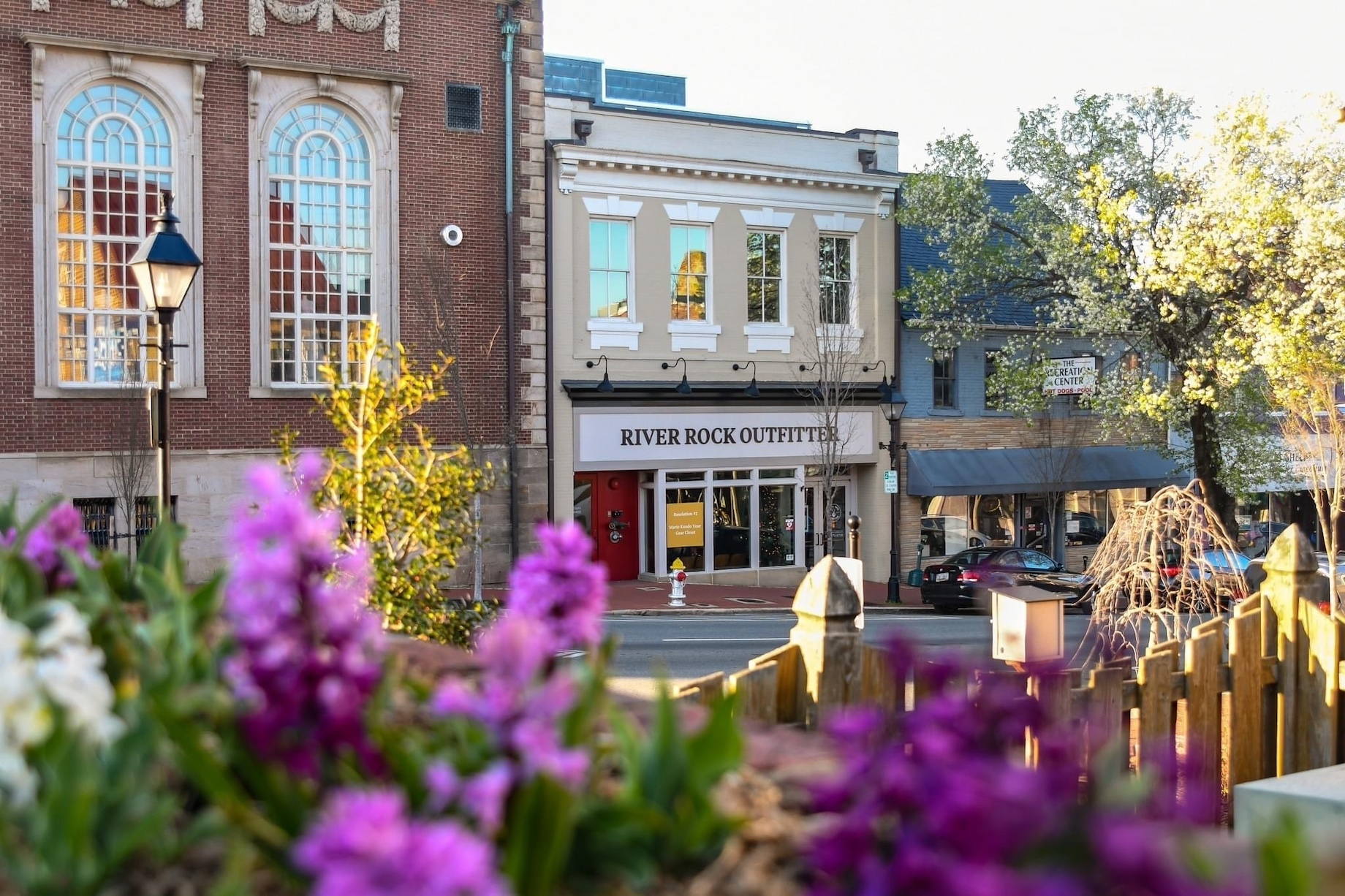April and Keith Peterson — owners of Fredericksburg, Virginia outdoor-recreation retail store River Rock Outfitter are nimble by nature, both Marine veterans. That has enabled their business to stay profitable over 10 years. When April saw that women were not well-represented in outdoor recreation, she started a program to help them feel comfortable and confident outdoors. When supply chain issues affected the availability of gear during COVID, the duo started a consignment program.

River Rock Outfitter
ICSC Small Business Center contributing editor Rebecca Meiser talked with April about how and why River Rock Outfitter has been changing things up and why. “If you sit back and just do the same thing year after year, season after season, then don’t complain why you’re not seeing revenue growth,” April said. “You can’t keep your feet in the mud.”

April Peterson, center, with River Rock Outfitter co-founder and husband Keith Peterson, in the red hat fly-fishing with friends in the Rappahannock River in Fredericksburg, Virginia
The outdoor-recreation retail industry is predominantly populated by men, yet you want to create a welcoming environment for women. How did that become your mission?
All the females I worked with in the Marine Corps were powerful people — we all kind of just forced ourselves into meetings — but in the outdoor industry, I started to really see how many barriers there were to women entering the outdoors, simple things like safety. Women were scared. They thought: “How do I go on a trail by myself if I can’t find a friend who wants to go with me?” So they didn’t go. There was also the confidence level of trying something new like paddling, hiking or rock climbing. It just wasn’t as inherent as I thought. And clothing, gear — those things were not specific to women in the way they are now. The outdoor industry used to say for women’s gear: “Shrink it and pink it.” They would just take a men’s pack, shrink it and put pink on it. They would call that a woman’s pack, but packs should be built for women’s specific bodies. We opened our doors in 2014, but in 2016, I started recognizing that if I’m going to own an outdoor-gear store, then I had a real responsibility to women in my community to help them get past some of these barriers.
So how did you do that?
I formed a program that we coined GirlsGo, which stands for Girls Get Outside. I would host specific classes to help build confidence through competence. I brought in so many cool experts like female rock climbers, female paddlers, female hikers, just real leaders in our industry to talk to our local women and show them how to do it on their own. It’s been one of the greatest things we’ve done. The interest [in the program] just exploded. It has translated into who I hire. When women come into my store, I want them to see other women. When you go into an outfitter, most are staffed by men. Not that there’s anything wrong with that, but they don’t look like me.

Eighty percent of River Rock Outfitters staff are women, including assistant store manager Amanda Thomas, at left, and sales associate and lifestyle blogger Amie Barbieri, at right.
What about your customers? Are they mostly women, as well?
Women make up a majority of our customer base but are still mostly buying for men, so our sales are still heavy on our men’s side.
Is there a reason for that?
I’m constantly learning from my customers. We just did a customer satisfaction survey. I love surveys because it gives people the opportunity to really tell us how we’re doing. Of course I enjoy the compliments, but I enjoy the constructive feedback more. We found that women who were coming in — we didn’t have the right sizes for them. They were like: “We feel bad when we come in and there’s not a pair of pants that fit us. We would like for you to carry more plus-size clothes.” I thought I had been doing so good, covering all my bases. I’m providing education, I’m hiring females, I’m out talking about women in the outdoors, and yet here was something so simple. I actually wasn’t covering those bases.
We have people who come in the shop every day, telling me: “Can you get me this size or that size?” It was always smaller women though. I think larger women were scared to tell me and maybe had some embarrassment around it and didn’t want to tell me: “You need to carry bigger sizes.” But in an anonymous survey, they felt comfortable telling me that. That’s exciting to me because I can make that change.
Sustainability is one of your store’s guiding values. Tell me how that led to a new core venture for you.
We’ve always had a sustainability mission. We practiced that in all the little ways: not having plastic bags, making sure we have LED lighting in our shop, doing river cleanups and really pushing sustainability messaging with the brands we carry. But during COVID, we really struggled, like the entire outdoor industry, with getting gear. Here was this whole new customer base of people wanting to get outdoors, and the gear companies couldn’t keep up. They were having shipping delays because of the shutdowns in China, Taiwan and Vietnam. Literally, I didn’t have gear. At the same time, gear is expensive. I didn’t want that barrier in place. We tell people a lot of times: “If you can’t afford it, don’t buy it. Just go hike. You don’t need the latest, greatest backpack or shoe or coat.” We love gear, but you don’t need it to get outdoors. I wanted to show them how they could get into it in a cheaper way, but I didn’t have the products to push them towards.
The other piece that I recognized is that so much of the outdoor-industry gear is meant to last a lifetime. It’s not meant to be thrown in landfills, and when it’s thrown in landfills, it’s not being recycled. I realized we could start a consignment program. People who are not using their gear could bring me gear and I’ll sell it for him, and we’ll split the price. That keeps stuff out of the landfill. It takes away a barrier for people who want to get good gear but at a cheaper price. And at a time when I [as an inventory buyer] couldn’t get gear, this was one way that I could keep my business running.
How did that program — you call it Re-Boot — go for you?
We started a consignment program in 2020. I was always excited to have it, but I never thought it would become such an important part of my business. It not only allowed us to survive COVID, but man, we thrived during COVID. We’ve continued to grow by 20% every single year since 2020, including a really hard year last year. When a lot of the outdoor industry started to see a decline in numbers, we still increased by over 20%. A big part of that is because of this new program.
So how did you get started? Did you have to change your business practices to make this work?
That’s the hard part, the not fun part, but yes, it’s a totally different way of running a business, managing your point of sale, managing your customers. I was really lucky. In 2020, my sister and her husband moved to Virginia to be closer to us. My brother-in-law worked for me for three years, and his singular focus was to get Re-Boot up and running. I relied a lot on my fellow small business owners who were already doing this. There were great outdoor-gear programs that were making consignment work. I talked to those guys. They helped me with their policies and processes. They told me the lessons that they’d learned over time so that I could get started quicker.
Do you get resellers from all over the country?
It’s hyperlocal. It’s mostly people who are dropping things off here. They have two options. They can either do a 50/50 split where we send them a check payout, or they can do a 60/40 split where we give them 60% in store credit. The majority of people actually do the store credit option. That’s helpful for us because no cost is going out. They can buy new stuff in the store. It’s a win-win-win for everybody involved because the consignor gets store credit, we get new purchases and we don’t have to front that gear. It’s not a liability for us because we don’t buy it upfront.
Was it hard to find a space for your store?
I don’t think that we understood how important that decision was, and it almost killed our little business. For our first five years, we were in a different building. That space was one street behind what’s considered the main street in our district. It’s next to a public parking lot and right near the river. On paper, everything seemed right, but it turns out one street behind Main Street makes a big difference. I don’t know that we understood what kind of difference that would make in terms of foot traffic. For five years, the amount of money we had to spend to acquire every single customer was a real challenge for our business. After that lease was up, we looked for another space that was in a more high-traffic area. We moved into our new space in September of 2019, right before COVID. We didn’t know it at the time, but that move saved us during COVID because we had visibility and natural foot traffic to our store.

River Rock Outfitter moved into its current space on a primary commercial street in downtown Fredericksburg, Virginia. That 2019 move from a less visible location a block away saved the business during COVID, co-founder April Peterson said.
Where do you want to be in five and 10 years?
We’re still surprised in so many ways that we’re still here. It’s so exciting. One of our biggest challenges, though, is that we’re renters. I think for a small business to really build value in their company, they need to own their own space. We’ve been saving our money so if a building opens up we can buy it. When we decide to retire, I hope that we’ll be able to sell River Rock, especially since we’ve put so much value into it, but people want to buy a business that has its own building. They want the infrastructure along with the business name, so that’s what we’re focused on in the next five years.
By Rebecca Meiser
Contributor, Commerce + Communities Today and Small Business Center